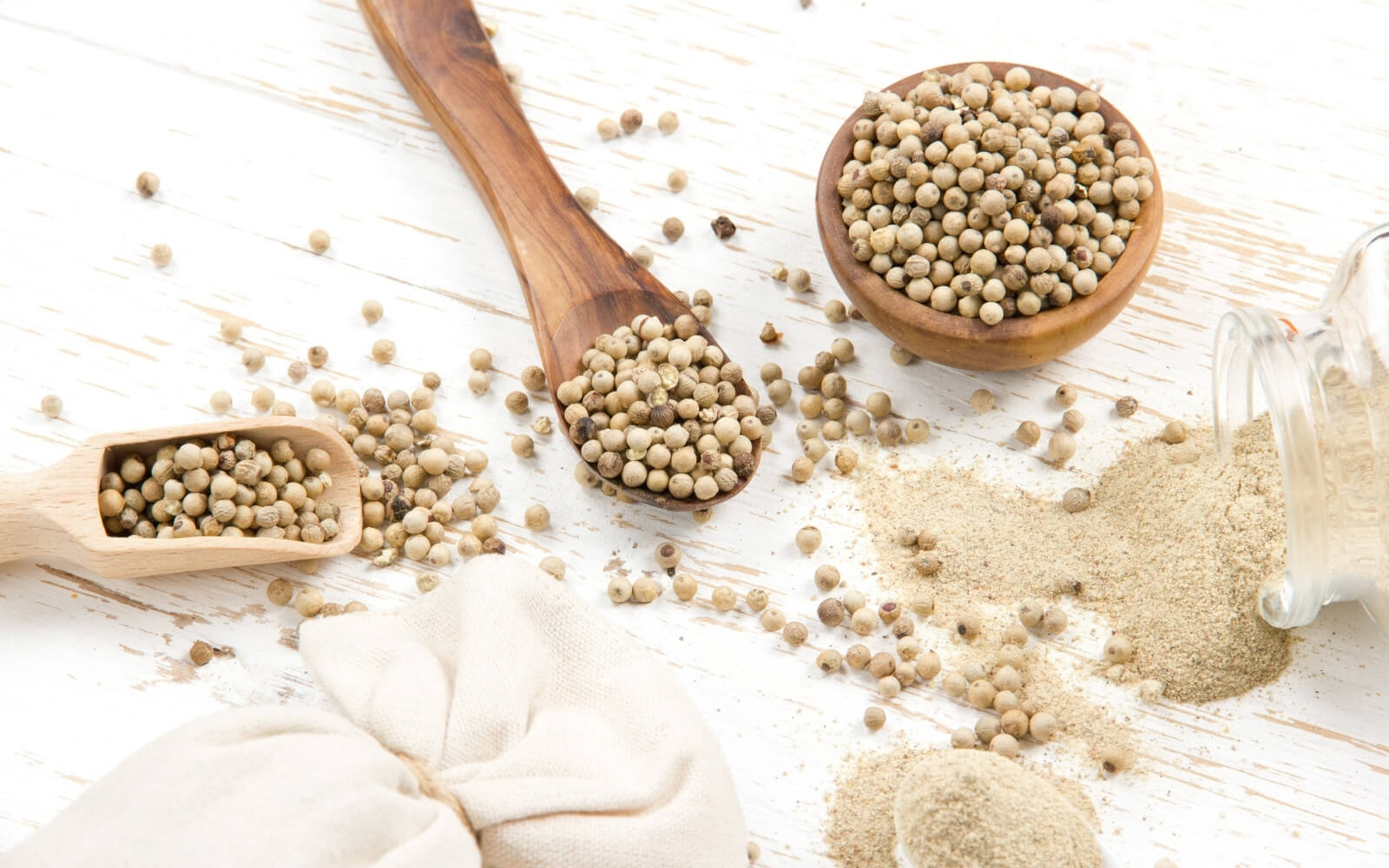Bioperine Benefits

Bioperine Benefits
Black pepper is one of the most commonly used kitchen spices. In fact, you probably have it somewhere in your home. Black pepper, however, is more than just an ideal kitchen flavor. It also contains something that can beneficial to your health. A nutrient called piperine. Often times referred to as bioperine. In this article we discuss the benefits of bioperine, piperine vs bioperine, and how turmeric and piperine can be used in conjunction with one another.
What is Bioperine?
Bioperine is a patented and highly absorbable form of piperine that is found in many supplements today. Research suggests that bioperine can help increase nutrient absorption, stabilize blood sugar levels, fight off cancer cell growth, reduce inflammation and more.
Bioperine vs Piperine
Piperine and bioperine are both names for the same ingredient, black pepper extract. Bioperine, however, is patented, highly absorbable form of piperine.
Bioperine Has Potent Antioxidant Properties
Black pepper also known as piperine may have potent antioxidant properties. Studies suggest that a diet high in antioxidants may prevent or delay damaging effects of free radicals.
Free radicals are unstable molecules that can damage your cells. Some free radicals are created naturally — such as when you exercise and digest food. However, excessive free radicals can be formed with exposure to things like pollution and cigarette smoke. Excess free radical damage has been linked to inflammation, premature aging, and certain cancers. Test-tube and rodent studies have observed that ground black pepper and piperine supplements may reduce free radical damage.
Bioperine Can Increase Nutrient Absorption
Piperine increases the absorption of essential nutrients such as curcumin. Curcumin is a polyphenol (micronutrients we get through certain plant-based foods) with anti-inflammatory properties primarily found in turmeric. One of the most common uses of piperine/bioperine in supplements today is to increase nutrient absorption.
Turmeric Bioperine Benefits
Despite its reported benefits via inflammatory and antioxidant mechanisms, one of the major problems with ingesting turmeric by itself is its poor bioavailability. Bioperine, however, a major active component of black pepper and a key ingredient in Stemulife™ is associated with an increase of over 2,000% in the bioavailability of curcumin.
Bioperine Can Boost Brain Function
Bioperine has been shown to improve brain function in animal studies. A study in rats with Alzheimer’s disease found that piperine improved memory, as the distribution of piperine enabled the rats to repeatedly run a maze more efficiently than rats not given the compound. In another rodent study, piperine extract seemed to decrease the formation of amyloid plaques, which are dense clumps of damaging protein fragments in the brain that have been linked to Alzheimer’s disease. Studies in humans are needed to confirm whether these effects are also seen outside animal studies.
Bioperine May Lower Cholesterol Levels
Piperine has been studied for its affect to potentially reduce cholesterol levels in animals. High blood cholesterol is associated with an increased risk of heart disease - which is the leading cause of death in the U.S.
In one 42-day study, rats fed a high-fat diet and a black pepper extract had decreased blood cholesterol levels, including LDL (bad) cholesterol. The same effects were not seen in the control group. Additionally, black pepper and piperine are believed to boost the absorption of dietary supplements that have potential cholesterol-lowering effects like turmeric. Studies have shown that black pepper may increase the absorption of the active component of turmeric - curcumin - by up to 2,000%.
Bioperine Has Anti-Inflammatory Properties
Chronic inflammation can be linked to almost any disease. Studies suggest that piperine—the main active compound in black pepper—may effectively fight inflammation. A study in rats with arthritis and treatment with piperine had a result of less joint swelling and fewer blood markers of inflammation. Vitro Biopharma has studied the effects of nutraceuticals on your body's stem cells and studies suggest piperine may have anti-inflammatory effects.
Piperine May Have Cancer-Fighting Properties
Research suggests that piperine may have cancer-fighting properties. Early test-tube studies have found that piperine slowed the replication of breast, colon, and prostate cancer cells and also induced cancer cell death (apoptosis). What's more, piperine has displayed in laboratory studies the potential of reversing multi drug resistance in cancer cells—an unfortunately common issue that can interfere with the effectiveness of chemotherapy treatment.
Piperine Supplement
Bioperine and piperine supplements have an incredibly high antioxidant capacity, aid in blood sugar control, support brain and heart health, and also help significantly boost the absorption of curcumin. You can shop Stemulife, a cellular health supplement formulated with natural ingredients like curcumin, piperine, resveratrol, and quercetin here.

Bioperine Benefits Summary
Black pepper is more than just a kitchen staple and is worth adding into your daily cooking routine for its health benefits. Black pepper and its active compound bioperine have many potential health benefits. This includes:
- Increase the absorption of other nutrients
- May boost brain power
- Powerful antioxidant properties
- May have cancer-fighting properties
- Can lower cholesterol levels
Piperine and Bioperine are both names for the same ingredient, black pepper extract. Bioperine, however, is patented, highly absorbable form of piperine. For more questions regarding the benefits of bioperine please see our frequently asked questions below.
Frequently Asked Questions About Bioperine

Q: What is Bioperine used for?
A: Bioperine helps increase energy production in cells, which can increase metabolism. A more responsive metabolism can allow individuals to achieve their weight loss goals at a faster rate.
Q: What are side effects of Bioperine?
A: Possible side effects of bioperine include nausea, gas, confusion, and over excitement.
Q: Is black pepper and Bioperine the same?
A: Black pepper and bioperine are both names for the same thing.
Q: What does turmeric and Bioperine do?
A: When combined, curcumin and piperine tend to have a greater effect on inflammation, digestion, reducing pain and fighting cancer.
Q: Does all black pepper contain Bioperine?
A: Bioperine is simply the trade name of a specific brand of black pepper extract.
Leave a comment
Comments will be approved before showing up.
Also in Ingredients

Licorice Root: Benefits, Side Effects & Dosage

Slippery Elm Bark Benefits, Side Effects & Dosage










